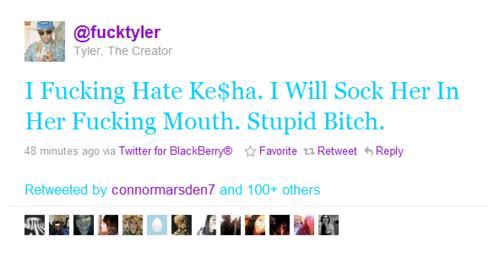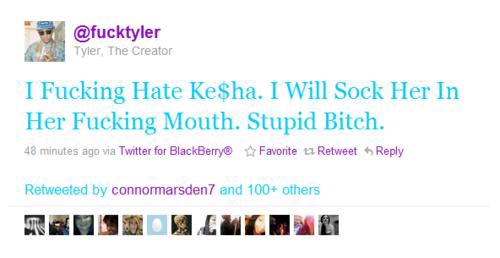Odd Future, Hip-Hop, Misogyny, and the Internet
by David Cho


There’s a fight happening on Tumblr right now (man, this sentence is not starting off very well!) that revolves around the misogynistic “character” of Tyler, the frontman of the recently very-internet-popular California rap group Odd Future. One argument is that as an artist his intent is to provoke and push the boundaries of what we’re comfortable with, and because of that we shouldn’t try to quiet his self-expression. The counterpoint is that he’s crude and offensive. There’s also a third, much smaller argument that’s happening adjacent to the first two arguments that pits Charlie Sheen (sure, why not) against Tyler in a “who’s worse” contest. Here’s the thing, everyone’s not not wrong!
The main justifications that Tyler defenders, and — based on a peripheral scan of the hip-hop thinkers on my Twitter feed — really the hip-hop community as a whole make for Tyler’s behavior is that he’s playing a character, and that hyperbolic, larger-than-life characters are a proud tradition within the genre. True, many of the most successful, iconic rappers never lived the lives they rapped and wrote about: Tupac was a theater nerd, Biggie was never really a big-time drug dealer, and most recently Rick Ross (the Boss) was outed as a former correctional officer — not the Scarface-style kingpin he portrays himself as. In fact, Dr. Dre isn’t a real doctor, my understanding is that he never even began residency after finishing medical school.
It’s also been pointed out that people who’ve met and worked with Tyler say he’s a genuinely nice kid! And that not all of what Odd Future puts out there is about rape and hating women, and that it just so happens these are the songs and parts of his persona that have been the most popular, and/or retweeted.
And these people, the ones who defend Tyler, aren’t wrong that what Tyler’s doing isn’t something that’s never been done before in hip-hop. I’d take this argument one step further and say that all of this is/was done even more offensively (if you’re offended, that is) and on a larger platform by the most popular and commercially successful rapper of the last decade — Eminem. And, really, Eminem’s catalogue is far more vulgar and filled with hatred toward women than what Odd Future’s put out in their short career.
But where the Tyler defenders’ argument falls a little bit flat is the fact that just because it’s been done in the past doesn’t make it OK. If someone punched you in the face last week, it wouldn’t be OK for them to punch you in the face again today, right? (If your answer to that is “punch away,” then disregard this next bit.)
There’s probably even a little bit of hypocrisy to their argument, because if Tyler were a Southern-looking white dude, let’s say really stereotypically fratty — I’m thinking, like, Patagonia fleece, some Tevas, probably some sort of Carhart pant — who’s “stage persona” was of a really racist white guy whose popularity stemmed from tweets like, “I Hate Black People [or, realistically, a more offensive word] And I Want To Kill Them All” (side note: one of the more annoying things that Tyler does, something that annoys me on a personal level, is his capitalization of the first letter of all the words in his tweets, WHY IS HE DOING THIS? [Answer: He’s an artist. Oh, my bad]) then they would probably think the white guy was terrible. Even if it was just a “character” he was playing, my guess is that — and I acknowledge that this is an assumption about an already hypothetical situation — they would respond not unlike the women and men upset by Tyler’s words and persona.
While it’s true exaggerated characters can provide entertainment, it seems like if you’re going to give a pass to this sort of thing, you have to make sure you’re completely objective and open about all of the media you consume, not just the things that happen to not offend you. Conversely, if you’re going to criticize Tyler, make sure you’re holding your other entertainment figures to the same standard. (And if you’re going to criticize Tyler, make sure there’s never been an occasion when you’ve been cool with Eminem and his music, because, well, as I said above, Eminem’s probably been more detrimental to women — if not directly, then at least by way of influence — than some random some kid who’s sort of popular on the internet.)
Or: It’s tricky to have vehement arguments about a subjective topic!
As far as how Charlie Sheen fits into all of this, and who’s “worse,” it seems silly that we can’t allow both of them to be detrimental to our societies in their own special ways. On one hand, praising Charlie Sheen for his whole “whatever” attitude, as is currently popular, seems icky considering his history of domestic abuse — and this argument was made more articulately by the much smarter Anna Holmes today in a Times piece that does not involve the word icky. And on the other hand Tyler’s misogynystic and at times rapey persona is probably influencing younger, dumber kids who may not know that it’s all an act (and, for what it’s worth, I’m not completely dumb or particularly young, and until I did some serious digging, I had no idea it was an act). And regardless of whether or not you like Odd Future, you can probably agree that that’s not completely awesome.
David Cho is the publisher of The Hairpin.